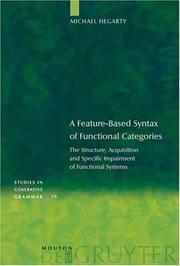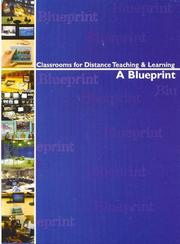| Listing 1 - 5 of 5 |
Sort by
|
Multi
ISBN: 9781107085763 1107085764 9781316084434 9781107449985 1107449987 131646878X 1316468534 1316084434 1316470288 1316469034 131646928X 1316467031 9781316470282 9781316469286 Year: 2016 Publisher: Cambridge: Cambridge university press,
Abstract | Keywords | Export | Availability | Bookmark
 Loading...
Loading...Choose an application
- Reference Manager
- EndNote
- RefWorks (Direct export to RefWorks)
This book shows that the semantic analysis of modal notions of possibility and necessity can be used to enhance our understanding of the interpretation of reports of belief or emotional state. It introduces intuitive notation and terminology to express ideas in modern theories of modal interpretation that are normally represented in complex logical formulas, effectively updates the 1960s-era link between possible worlds and the semantics of propositional attitude ascriptions, and reconciles two disparate views of the role of events in semantic interpretation, that of Donald Davidson and that of David Lewis. It reduces a host of variable behaviors of propositional attitude ascription to an intuitive and precise distinction between ascriptions that merely express a commitment to propositional content versus ones that attribute a mental state to the holder of the propositional attitude. This leads to an explanation of the nature and effects of the language disorder of fluent aphasia.
Lexicology. Semantics --- Psycholinguistics --- Grammar --- Modality (Linguistics) --- Semantics --- Grammar, Comparative and general --- Psychological aspects --- Prepositional phrases --- Linguistics --- Psychological aspects. --- Prepositional phrases. --- 801.56 --- 801.56 Syntaxis. Semantiek --- Syntaxis. Semantiek --- Modality (Linguistics). --- Philology --- Semantics - Psychological aspects --- Grammar, Comparative and general - Prepositional phrases

ISBN: 3110895404 9783110895407 3110184133 9783110184136 Year: 2005 Publisher: Berlin Mouton de Gruyter
Abstract | Keywords | Export | Availability | Bookmark
 Loading...
Loading...Choose an application
- Reference Manager
- EndNote
- RefWorks (Direct export to RefWorks)
This book develops ideas of Minimalist syntax to derive functional categories from the partially-ordered features expressed by functional elements, thereby dispensing with functional categories as primitives of the theory. It generalizes attempts to do this in the literature, while drawing significant empirical consequences from general constraints formulated to block overgeneration. The resulting theory of the construction of functional categories is applied to various problems in syntactic analysis and comparative and historical syntax, including variation across Germanic languages in patterns of verb-second and in the occurrence of expletive subjects in existential constructions, verb positions in Old and Middle English, problems regarding the placement of clitic pronouns in Romance languages and Modern Greek, and some previously unexamined structures of reduced clause coordination in colloquial English. Facts from early stages of the acquisition of syntax are shown to follow from the mechanisms for the projection of functional features as functional categories, exercised before all of the features for a language, along with their ordering and feature co-occurrence restrictions, have been acquired. It is observed that child acquisition of functional elements exhibits successive developmental stages, each characterized by the number of clausal functional elements which can be represented together within a clause. This, and facts regarding the lag in development of functional categories by children with specific language impairment, are shown to be not entirely reducible to limitations in working memory or processing capacity, but to depend in part on the growth of representational resources for the projection of functional categories.
Grammar, Comparative and general --- Functionalism (Linguistics) --- English language --- Language acquisition. --- Language disorders. --- Language and languages --- Syntax --- Functional analysis (Linguistics) --- Functional grammar --- Functional linguistics --- Functional-structural analysis (Linguistics) --- Grammar, Functional --- Grammatical functions --- Linguistics --- Structural linguistics --- Categories, Grammatical --- Grammatical categories --- Categorization (Linguistics) --- Componential analysis (Linguistics) --- Dysphasia --- Communicative disorders --- Acquisition of language --- Developmental linguistics --- Developmental psycholinguistics --- Language development in children --- Psycholinguistics, Developmental --- Interpersonal communication in children --- Psycholinguistics --- Grammatical categories. --- Syntax. --- Grammar, Historical. --- Major form classes --- Acquisition --- Grammar --- Germanic languages --- Philology --- Grammar, Comparative and general Syntax
Digital
ISBN: 9783110895407 9783110184136 Year: 2011 Publisher: Berlin ;; Boston De Gruyter Mouton
Abstract | Keywords | Export | Availability | Bookmark
 Loading...
Loading...Choose an application
- Reference Manager
- EndNote
- RefWorks (Direct export to RefWorks)

ISBN: 906186867X Year: 1998 Publisher: Leuven Universitaire Pers Leuven
Abstract | Keywords | Export | Availability | Bookmark
 Loading...
Loading...Choose an application
- Reference Manager
- EndNote
- RefWorks (Direct export to RefWorks)
Didactic strategies --- Onderwijssystemen --- Systèmes d'enseignement --- Distance education --- Telecommunication in education --- Academic collection --- #eLINK --- #BAVD --- 371.311.5 --- Education --- Distance learning --- Open learning --- Klassikaal onderwijs. Schoolklassen --- Distance education. --- Telecommunication in education. --- Lerarenopleiding --- algemeen --- algemeen. --- 371.311.5 Klassikaal onderwijs. Schoolklassen --- Algemeen.
Digital

ISBN: 9783110402001 9783110402117 9783110374728 Year: 2016 Publisher: Berlin ;; Boston De Gruyter
Abstract | Keywords | Export | Availability | Bookmark
 Loading...
Loading...Choose an application
- Reference Manager
- EndNote
- RefWorks (Direct export to RefWorks)
| Listing 1 - 5 of 5 |
Sort by
|

 Search
Search Feedback
Feedback About UniCat
About UniCat  Help
Help News
News